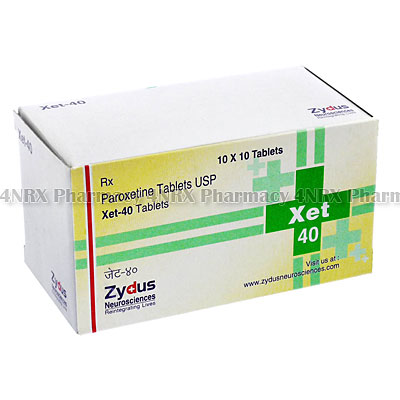 |
Home  Antidepressants Antidepressants  Xet (Paroxetine) Xet (Paroxetine) |
|
|||||||||
|
|
Xet (Paroxetine)
What is Xet (Paroxetine) used for? Xet (Paroxetine) is an oral selective serotonin reuptake inhibitor (SSRI) used to treat patients who are suffering from depression, obsessive-compulsive disorder (OCD), or anxiety disorders. The medication balances adjusts the levels of neurotransmitters in the brain to prevent symptoms such as feelings of worthlessness, feelings of guilt, loss of interest in previously pleasurable activities, fatigue, anxiety, or obsessive thoughts. Your doctor may also prescribe its use for the treatment of other unlisted conditions. How should I use Xet (Paroxetine)? Strictly follow the instructions of your doctor while using Xet (Paroxetine) to get the most effective results from treatment. The normal dosage is one tablet that is administered daily, but your particular instructions will depend on the condition being treated, your current health, and the severity of your symptoms. These should be swallowed with a full glass of water and may be taken on an empty stomach, but a meal is suggested before use if you get an upset stomach. Do not split or crush the tablets before use to avoid destroying or altering the effects of their contents. What are the side effects of Xet (Paroxetine)? Symptoms that may occur while using Xet (Paroxetine) include:
Stop using the medication and contact your doctor as soon as possible if you experience any serious side effects such as low sodium levels in the body, sensitive skin, easier bruising, bone pain, muscle pain, or severe skin reactions such as hives or rashes. These conditions may require lower doses, reduced frequency of administration, or emergency medical attention in serious cases. Please Note Xet (Paroxetine) should not be used by patients who are children, are taking MAOI or antipsychotic medications, or who have untreated epilepsy or bipolar disorder. Also tell your doctor if you have other conditions that can cause complications during treatment such as if you are elderly, a young adult, taking clotting medications, taking antipsychotic medications, or have a bleeding disorders, history of manic episodes, epilepsy, history of glaucoma, heart disease, or decreased liver or kidney problems. These conditions may cause unexpected problems during treatment requiring special adjustments to your treatment. Strictly use Xet (Paroxetine) as prescribed and follow all instructions provided by your doctor. Safe, suitable, and optimum dosage can vary and is dependent on the patient`s health and medical history, as well as the condition you are treating. Xet (Paroxetine) may not be safe or suitable for all patients. Always ensure your doctor is informed if you are pregnant or breastfeeding, using any other type of medication (including non-prescription medicine, vitamins, and supplements), as well as if you have any allergies, other illnesses, or pre-existing medication conditions. Seek immediate medical attention or proceed to your nearest accident and emergency department if you suffer a hypersensitive or allergic reaction. Symptoms usually present during a reaction of this nature include difficulty breathing or swallowing, swelling of the limbs or face, tight chest, hives, and skin rashes. 











|
||||||||||||||||||